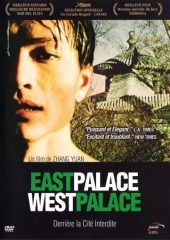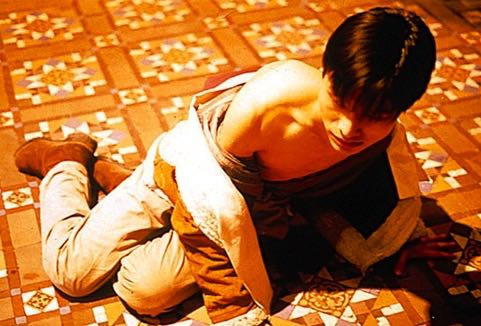 East Palace, West Palace
East Palace, West Palace
Directed by Yuan Zhang
Written by Wang Xiaobo and Yuan Zhang
Premier: Nov. 1996, Argentina
U.S. Premier: June 13, 1998
Drama (foreign)
90 min. • Find on imdb
Review by Stephen O. Murray
October 4, 1998.
Close to a one-man show, Zhang Yuan’s East Palace, West Palace (smuggled out of China and first shown in Argentina 1996) is involving, though not at all likable.
The bravery of the director and the masochistic park cruiser are both considerable. A-Lan (Han Si) has many resemblances to Genet’s narrators—not least in eroticizing uniformed oppressors. Also in fearlessly insisting on their stigmatized desire (“I’m a tongzhi[1]Tongzhi means “comrade” and was the standard term of communist solidarity in Maoist times was appropriated by Chinese gay men for themselves—an attempt at transvaluation in the opposite … Continue reading… My love is not despicable”).
Friends familiar with life in the People’s Republic of China say that the film is very subversive in the PRC—showing concerted dissidence, the fascination of a state official with forbidden desire, etc. The married A-Lan [Han Si], who wants to take the girl’s part and is willing to be beaten by a man if he loves him, resists drag (even though he took on the role of a stripped drag queen earlier): he is a man who loves men. Given his eagerness to submit to the desire (and violence) of others, it is a bit surprising that he is so unwilling to don women’s clothes for the policeman [Hu Jun] —but then I don’t understand how the policeman can think this will “cure” A-Lan, and it is perhaps the rhetoric of a “cure” that makes A-Lan refuse.

In that the film is A-Lan’s statement of his desire (and fantasy or history), and that there is little facial expression from either A-Lan or his captor, the cinematography by Zhang Jian (who went on to shoot Shower and Lan Yu) is remarkable: in flashbacks, in the park, in the toilet, in the police office, and even in close-up.[2]The palaces of the title are park toilets in Beijing, where A-Lan cruises at night after the park is supposed to be closed. The location parallels the Taipei New Park cruising locale of Nie … Continue reading
posted on the defunct site AssociatedContent, 4 October 1998
©1998, 2016, Stephen O. Murray

